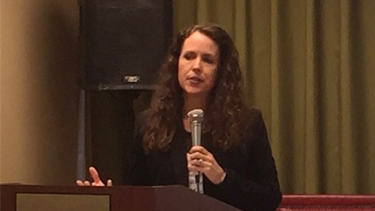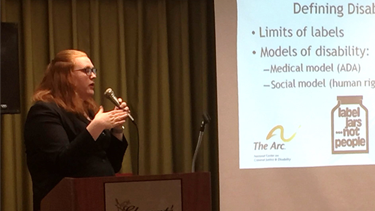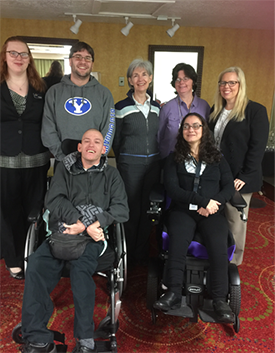3L Laura Johnson presents at training to help bridge gap between criminal justice and disability worlds
April 11, 2017

Imagine being held in pre-trial incarceration for 997 days, or almost three years, for a crime you did not commit.
This is what happened to Robert Gonzales, a young man with developmental disability, who falsely confessed to the rape and murder of an 11-year-old girl in 2005. While Robert was eventually released upon conclusive DNA evidence of another suspect, his story highlights what can happen when an individual with intellectual/developmental disability (I/DD) enters the criminal justice system.
To tackle the challenges individuals with I/DD face within the criminal justice system, The Arc of New Mexico conducted a Pathways to Justice® training on April 6, 2017 for law enforcement, legal professionals, and victim service providers within the Albuquerque area.

The Arc of New Mexico was awarded a grant by the Arc’s National Center on Criminal Justice and Disability (NCCJD) based in Washington D.C. to specifically conduct this training in an effort to highlight both obstacles and solutions. Personal stories shared by members of the New Mexico Center for Self Advocacy, people with either an intellectual or developmental disability, humanized experiences many of them face or fear they may face.
Laura Johnson, a 3L who interned with the NCCJD the summer of 2016, presented the perspective of a parent who cares for an adult son with Autism Spectrum Disorder. She wants “people to realize that certain behaviors from someone with I/DD, like lack of eye contact, eagerness to please, and ‘parroting’ back statements as they hear them are probably manifestations of that person’s disability, not clear indicators of guilt.”

Johnson is also a member of the newly formed Disability Response Team (DRT), a group compiled of attorneys, police officers, disability advocates, and individuals with I/DD, to bring awareness to the obstacles people with I/DD face either as victims or suspects. In addition to providing training, the DRT hopes to provide actual advocacy for those with I/DD who finds themselves caught up in the criminal justice system, ensuring constitutional rights protections and promoting diversion programs.
As for the recent training, Johnson commented, “I was surprised to see how many police officers and prosecutors attended. These are the folks who can stop the criminal justice ‘train’ before it ever leaves the station, which has huge implications for the falsely accused.”
